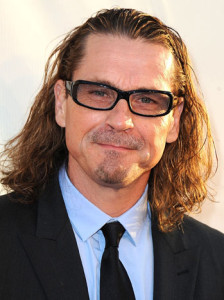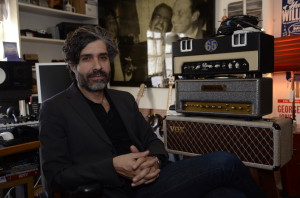Music and Narrative: An interview with Sons of Anarchy Creator Kurt Sutter and Music Producer Bob Thiele, Jr.
Few shows on TV use music as effectively, or as centrally, when telling a story as the FX series Sons Of Anarchy (SOA), now in its sixth season. This is in no small part due to SOA creator Kurt Sutter’s belief in music as narrative.
 The Rahway, NJ born screenwriter, director, producer and actor grew up in the shadows of Rahway Prison, and after a stint at Rutgers University (BA, Film) he spent several years acting off off-Broadway, teaching and directing in NYC. In 1997, after receiving a MFA Fellowship at Northern Illinois University, he was inspired by dramatic masters like Strindberg, O’Neill and Genet, leading to his interest in screenwriting. After Graduation in 2001 (MFA), Sutter moved to LA, where he began writing, getting his first TV writing gig as a staff writer on FX’s “The Shield,” rising to the title of Executive Producer by season six.
The Rahway, NJ born screenwriter, director, producer and actor grew up in the shadows of Rahway Prison, and after a stint at Rutgers University (BA, Film) he spent several years acting off off-Broadway, teaching and directing in NYC. In 1997, after receiving a MFA Fellowship at Northern Illinois University, he was inspired by dramatic masters like Strindberg, O’Neill and Genet, leading to his interest in screenwriting. After Graduation in 2001 (MFA), Sutter moved to LA, where he began writing, getting his first TV writing gig as a staff writer on FX’s “The Shield,” rising to the title of Executive Producer by season six.
Currently, he’s the Creator and Executive Producer of SOA, also serving as writer or co-writer of many of its episodes, with a finger on the pulse of all aspects of show development including music.
 Bob Thiele, Jr., is SOA’s Music Producer and an accomplished, award-winning Guitar player songwriter, producer and executive who has worked with artists that include Bonnie Raitt, MC Solaar, Aaron Neville and Bette Midler, among others. As Music Producer for SOA, he not only selects tracks and composes original work for the show but also works closely with Sutter and the rest of the creative team to loom music into the narrative of the SOA story.
Bob Thiele, Jr., is SOA’s Music Producer and an accomplished, award-winning Guitar player songwriter, producer and executive who has worked with artists that include Bonnie Raitt, MC Solaar, Aaron Neville and Bette Midler, among others. As Music Producer for SOA, he not only selects tracks and composes original work for the show but also works closely with Sutter and the rest of the creative team to loom music into the narrative of the SOA story.
Recently, Kurt and Bob joined me to discuss how they create the musical narrative for the show, the business of music for TV, and how they work with musicians to develop a winning musical formula that resonates with fans.
MF: How does music integrate into the creative development process for SOA?
Kurt: Thematically, I knew that music would be very important in this series [Sons Of Anarchy] mainly because I’m a big music fan and have always been a big fan of the use of music in cinema and TV. It’s been part of my process.
I knew I didn’t want to score the show – it didn’t feel like the right thing to do – but I knew that I wanted music to be an important part of it. And being somewhat naïve coming into the process and not having run a show before – I brought Bob into the process early to really try to figure out how to create a sound for the show since I just knew that Sons Of Anarchy was a somewhat bleak world and we were going to be dealing with somewhat dark and potentially heavy subject matter.
It was really Bob’s idea to create a unique sound for the show.
Going back to the origins of the subculture and when and how it hit the media, what we needed to do is hit on what the sound in the subculture is – sort of that 60’s California sound, which sort of became our touchstone, wouldn’t you say Bob?
Bob: Yea, it’s sort of like the template was that the music in that culture is kind of timeless. I’m not saying that it doesn’t change, but there’s an organicness and an Americana aspect to it that’s going to define instrumentation, that’s gonna define the music. You know, you’re not going to find those guys listening to a lot of electronica, so it narrows the palette for us.
As a result, you know who these guys are and where they come from. The musical DNA is sort of coming from the same place as Haight-Ashbury in the 60’s, Altamont, and those kinds of things. And that’s great, because Kurt and I knew exactly where to draw from.
Kurt: And I really had a sense of what our budgetary restraints were going to be and in the process understood the cost of certain masters, and that’s why I wanted to involve Bob. I didn’t want a music supervisor just to help me choose music, I wanted someone who could help me compose – not just in terms of scoring, but pulling together the elements and theme.
And that’s why we do all those great covers. We have our house band and Bob works with them to do those covers. In the process of being smart and trying to navigate around budget, we ended up creating what I think is the signature for the show.
And then, reaching in the opposite direction, and this makes sense in what we do in terms of our DNA, is finding unique and perhaps less famous artists as well.
Bob: You know, the independent artists that are off the radar and may not have the advantages of a major label or many not have that big an audience because, again, they’re coming from that more narrow audience.
So we’ve been able to find these really great bands and give them some exposure that has had significant impact on their careers – their ability to tour, their download sales and stuff like that.
Now, I do want to say that we’re not just taking a cover and re-voicing it, but we’re also using music as an integral part of the narrative – we kind of stumbled into this in the finale of the first season where we had this monumental use of “John The Revelator” (composer: Depeche Mode), and what would normally have been the use of a 3-4 minute song became this really long song that served as score for the actual narrative.
We did that with “Hey Hey, My My” (composer: Neil Young), we did that with “House Of The Rising Sun” (lyrics: Georgia Turner and Bert Martin ), we did that with “Sympathy For The Devil” (composer: The Rolling Stones) – where, because we can record it ourselves, and I have some idea what’s going on with the script, video and picture, I can go “okay, let’s put an instrumental version here, then bring the lyric back in here” because I knew where we have dialog, or a certain scene.
I think it’s a whole new paradigm on how you can approach scoring.
MF: That’s a very innovative way to evoke a music theme and integrate it into the narrative. Now, I want to touch on something you said in regards to the music you use and the people who make it. It would seem to me that a group like Depeche Mode would be into working with you on the show – possibly creating a re-record of the John The Revelator. So my question is do you ever work with the bands that originally created the music, or do you find that it would be more of a challenge than it’s worth?
Bob: Well, the short answer is not really. Fox is going to want ownership of that stuff, and the moment you bring in Depeche Mode trying to do a new version of John The Revelator, you’re then going to be dealing with all sorts of ownership issues and who gets what.
Now, what we did this year with Jane’s Addiction, who had already cut versions of tracks like “Sympathy For The Devil” 20 years ago, that allowed us to do something with a known artist that worked for the show.
The funny thing is, when we decided to do Sympathy, oddly enough, neither Kurt or I knew Jane’s Addiction did a version of Sympathy…
Kurt: We heard it on YouTube or something like that…
Bob: Yea, it was a live version on their first record – on Triple XXX Records. And since we had that in mind, Fox could present it – and, by the way, we’d already established the brand, so I think bands were like “yea, we want to be in this show, go ahead!”
MF: In other words, once the brand was established it was easier to reach out to known artists with a track you wanted that worked creatively, and because it was an existing track, it was easier from a business standpoint to make it happen.
Bob: Right.
MF: Now, in a general sense, what are you are doing in terms of reaching out to original artists versus independent artists for originals, or covers versus in-house? What is the breakdown? And how do you determine what’s the best choice in each case?
Kurt: Well, beyond creative and theme, it really depends. And, not to sound hokey – on the actual world itself, you know, the MCs (motorcycle clubs) are exploding in Europe and parts of Asia and they’re much bigger there than in the US now – I mean there are fucking Hell’s Angels in Kuwait.
MF: Really?
Kurt: Yea, I’m dead serious. They don’t have RICO breathing down their necks shutting them down and they’re really exploding in Europe and that’s building the attraction of the show and the awareness of the subculture, and this also influences the music we use. Not just who is making the music or where we’re getting it from.
MF: Let’s switch focus and talk about the business side of the soundtracks, which I know you are heavily involved in from a creative point of view. Do you guys and the artists involved participate? Or is that totally Fox or Columbia/Sony?
Bob: Well, that’s really Columbia/Sony. I mean when the first soundtrack came out, there was no real press, no EPK, interviews or any of that shit, just the social media stuff. And it was that one that in the first year sold about 50,000.
This year, with the new soundtrack, I think they put a little (marketing) muscle into that.
(Ed. And that marketing muscle has paid off with more than 100K physical sales and more than 1MM downloads)
Kurt: We also had a button that came up with a link at the end of the show online and on the DVD. Now I will say, and this is not to slam Fox, because everyone is still trying to figure out how to capitalize on that, but Bob has been trying to put together an SOA tour for like four years…
Bob: Five years
Kurt: And we get close, to include people like my wife Katie (Segal), and it seems like a slam-dunk, but nothing actually happens.
Bob: But now, there are actually offers on the table, which is amazing, and the money is like “you’ve got to be kidding.”
Anyway, all this stuff is organically happening. The record is one thing that’s not really Fox’s world: Fox just gives the shit to Sony, and Sony goes out and does whatever they do with it.
And Fox, as big as they are, you can’t really expect them to be all over the whole music component. They’ve got far bigger fish to fry, and I always say it… they have a show called “Glee” that decimates our audience.
MF: Certainly, they have to prioritize where they make their music marketing and promotional efforts, especially as a TV studio…
Bob: But they treat us, and I’m not just saying this for the sake of the article, they treat us extremely well, and are very respectful and appreciative of what we do and help us wherever they can.
Kurt: Yea, (FOX) Home Entertainment and Mobile and Music, they really do try to bend as much as they can, but it’s a pretty rigid structure. Anyway, we may actually go out and do a few SOA gigs this season.
Bob: Which is pretty exciting. We’ve already done two – one at the House Of Blues (LA) which was a benefit and we did one on set for Kurt’s fan event. They were both fantastic. All the artists who participated and the music was great and people were genuinely knocked out. And if we could take the music from the show on the road the fans would fucking love it, which is the only reason we do it.
Kurt: The good thing is, we throw those on the DVDs and Home Entertainment covers a chunk of the cost, and I think that helps us, because people watch that shit. And I think that watching that fan event and everyone perform live is symbiotic because it sells CDs and gives people the appetite for seeing it live.
MF: And it closes the loop in pulling people back to the show.
Kurt: We hope so.



